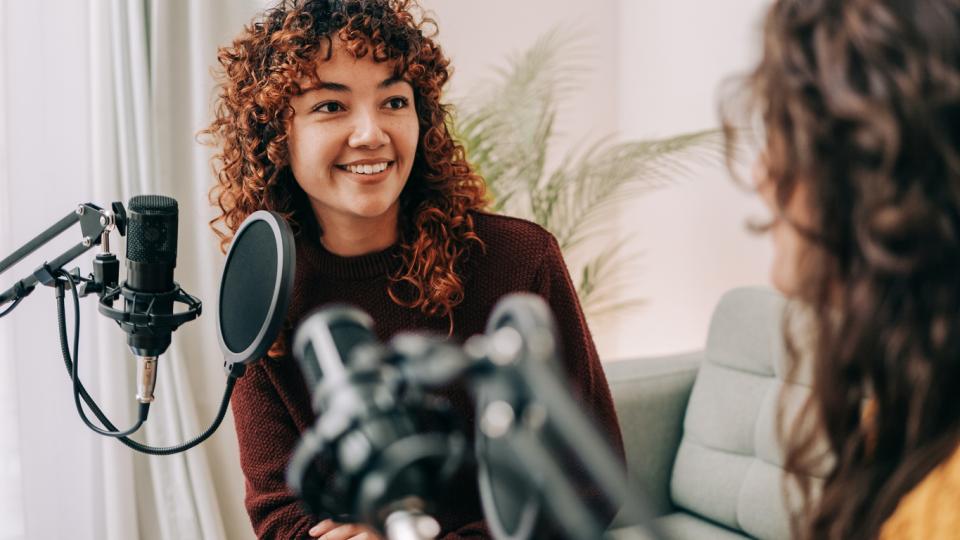The ways in which universities engage with students are constantly evolving. Emails, posters on campus and social media all have their limitations in reaching students where they are in a way that resonates with them. That is why we’ve embraced podcasting.
Launched in 2020 in response to the pandemic, our Student Support Podcast has been a valuable resource, providing students with information on the support available within the department of student services (including well-being and mental health, disability and inclusion, finances, and so on). However, as student needs change and new opportunities emerge, we recognised the potential to expand our scope. This led to a natural evolution: a rebrand to the Student Experience Podcast, a broader, more collaborative initiative between the University of Chester and Chester Students’ Union (CSU).
This change isn’t just about a new name. It’s about rethinking how we connect with students, ensuring they receive the information they need in a format they actively engage with. The podcast is proving to be an effective and innovative way to enhance student support, with over 10,000 downloads since its launch. If you’re considering launching a university podcast to support the student experience, here are tips to make it effective and engaging.
Meeting students where they are
We live in an on-demand world. Whether it’s streaming TV shows or listening to music and audiobooks on the go, the world (including students!) is accustomed to consuming content in flexible ways. Traditional communication methods – emails, web pages and in-person information sessions – still play an important role, but they require students to actively seek out the information. A podcast, on the other hand, fits seamlessly into their daily lives.
The Student Experience Podcast allows students to access key university information passively and on their own schedule. Whether they’re commuting, cooking or taking a break between lectures, they can tune in to discussions about everything from academic success strategies to well-being, mental health support and tips for making the most of university life. By embracing this format, we make it easier for students to stay informed without adding extra demands to their already busy lives.
Tip: Keep episodes concise and easy to digest. Aim for 20–30 minutes, ensuring students can tune in without feeling overwhelmed. Use well-known platforms like Spotify, Apple Podcasts or even university websites to make it easy for students to find and listen. Work with your marketing and admissions team to share the podcast with incoming students as an alternative way for them to find out about all you have to offer.
A collaborative approach
One of the most exciting aspects of the rebranded Student Experience Podcast is its collaborative nature. While the original podcast was university-led, hosted by the head of student experience, the new iteration brings in Chester Students’ Union as an equal partner, with the CSU president as a co-host. This change reflects a commitment to student-led conversations, ensuring that the content truly reflects student priorities and concerns.
By working together, the university and CSU can offer a more representative discussion on topics that matter most to students. The partnership ensures that student voices are at the heart of every episode, making the podcast a more authentic and engaging platform. It also fosters a stronger sense of community, demonstrating that student support is not just about institutional services but about shared experiences and peer-led insights.
Tip: Involve students as guest speakers, interviewers or even co-producers. This makes the podcast feel more authentic and relatable. Working with your students’ union to share the student voice is imperative!
- Spotlight guide: How to build belonging at your institution
- Not all students want to fit in, but every student wants to matter
- How student-led research can build belonging and agency
Destigmatising support services
A key challenge in student support is ensuring that those who need help feel comfortable seeking it out. There is still stigma around accessing certain services, particularly mental health and financial support. The Student Experience Podcast provides an informal and conversational way to discuss these issues, breaking down barriers that might prevent students from engaging with traditional support channels.
Through personal stories, guest speakers and expert advice, our podcast normalises discussions around common student struggles. Hearing fellow students, staff and professionals talk openly about challenges and solutions makes it easier for listeners to relate and feel reassured that they are not alone. This format helps demystify university support services, making them feel more approachable and relevant.
Tip: Use real stories and guest interviews to normalise seeking help. Featuring both staff and students willing to share their experiences can make services feel more approachable.
Spotlighting student success stories
University is about more than just academic success; it’s about personal growth, new experiences and preparing for the future. The podcast provides an opportunity to highlight success stories, showcase student-led initiatives and share advice on making the most of university and life beyond graduation.
From interviews with students, expert guidance and engaging guest speakers, our podcast aims to inspire and inform. It encourages students to take advantage of the wide range of resources available to them while also celebrating the achievements of their peers and shining a spotlight on the diversity of our university community.
Tip: Dedicate episodes to student-led projects, subject spotlights or alumni experiences. These stories help students see what’s possible and encourage them to make the most of their university journey.
Keep the conversation going
A podcast shouldn’t be a one-way broadcast; it should spark ongoing conversations. We actively encourage listeners to submit questions and suggest topics that they’d like us to cover. We dedicate the final episode of each series to answering our listeners’ questions.
Tip: Use social media or university platforms to gather feedback and interact with listeners. Engaging directly with students helps keep content relevant and fresh.
By using a medium that is flexible, engaging and student-driven, we’re breaking down barriers, fostering community, and making support more accessible than ever before.
For us, this is just the beginning. We plan to continue developing the podcast, bringing in more student voices, experimenting with live recordings and Q&A sessions and expanding our topics based on student feedback. The rebrand demonstrates how universities and student unions can work together in creative ways to enhance the student experience and student support.
And if there’s one thing we’ve learned, it’s that sometimes, the best way to support students is simply to start a conversation.
Shaunagh Moss is the head of student experience (induction, transition and retention) at the University of Chester.
If you would like advice and insight from academics and university staff delivered direct to your inbox each week, sign up for the Campus newsletter.




comment